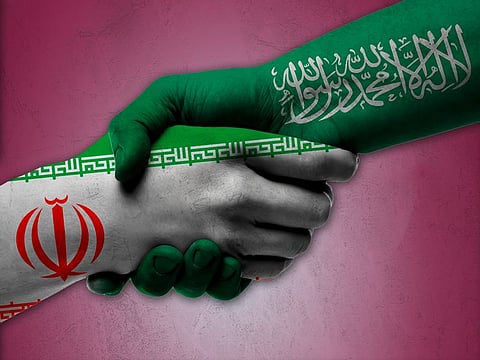Saudi Arabia-Iran reconciliation brings hope for peace in the Middle East
Riyadh and Tehran have agreed to put their differences aside with groundbreaking agreement

In a breakthrough in the region, Saudi Arabia and Iran agreed to resume diplomatic relations and reopen embassies within two months, according to a statement issued by Iran, Saudi Arabia, and China.
“The agreement includes their affirmation of the respect for the sovereignty of states and the non-interference in internal affairs,” it said. The deal which was powered by China was announced after bringing in the top security officials from the two countries to Beijing for talks, with China serving as a mediator.
The agreement between the region’s heavyweights Saudi Arabia and Iran has brought a ray of hope for stability and peace in the Middle East.
After years of tension and hostility, the two regional powers have agreed to establish diplomatic relations and reopen embassies along with re-establishing direct air travel between the two countries. But what does this agreement really mean for the region?
Harmony between the two sides
First and foremost, it is important to understand the context in which this agreement has been reached. Saudi Arabia and Iran have been rivals for decades, competing for influence in the region. They have been instrumental in shaping the political landscape of the Middle East.
In recent years, the tensions between the two countries have escalated to dangerous levels with the conflict in Yemen and the two countries have also been involved in a war of words.
Against this backdrop, the recent agreement between Saudi Arabia and Iran comes as a significant development. One also has to credit Iraq for behind-the-scenes efforts to bring in harmony between the two parties in the past few years, steps that no doubt led to the eventual agreements in Beijing.
Important détente in the region
There are several reasons why this détente is important for the region. Firstly, it reduces tensions and conflict in countries where Saudi Arabia and Iran are involved. For instance, in Yemen, the two sides could work together to find a peaceful solution to the conflict, instead of continuing to support opposing sides. This could potentially end the humanitarian crisis in the country and improve the lives of millions of people who have been affected by the war.
Secondly, the agreement could help to stabilise the region by reducing the risk of a direct military confrontation, with each country — in the past — accusing the other. This had raised fears of a wider conflict that could engulf the entire region. However, with the agreement in place, there is hope that such confrontations can be avoided.
Thirdly, the agreement could pave the way for a more cooperative relationship between Saudi Arabia and Iran. The two countries have much in common, including a shared history and culture. They also face common challenges, such as terrorism and extremism. By working together, they could potentially find solutions to these challenges and create a more stable and secure region.
Positive signs overall
Of course, there are also risks associated with the agreement. However, despite these risks, the fact that the two sides have agreed to resume diplomatic relations is a positive sign.
There have been some encouraging signs since the agreement was announced. There have been reports of increased trade between the two countries, which could help to boost economic growth in the region.
Saudi Finance Minister Mohammed Al-Jadaan stated last week following the agreement to restore diplomatic ties that Saudi investments into Iran could happen ‘very quickly’.
“There are a lot of opportunities for Saudi investments in Iran. We do not see impediments as long as the terms of any agreement would be respected. Stability in the region is very important, for the world and for the countries in the region, and we have always said that Iran is our neighbour and we have no interest to have a conflict with our neighbours if they are willing to cooperate.”
Dr. Ibrahim, a retired Saudi academician told Gulf News: “The recent agreement between Saudi Arabia and Iran marks a positive step towards peace and stability in the Middle East. While there are risks associated with the agreement, it is important to remain optimistic about the implications of this agreement and to continue to support efforts to promote peace and stability in the region. Only by working together can we create a more secure and prosperous Middle East.”
Indeed, the horizon, for now, promises a more stable and prosperous portrait.
— Tariq A. Al Maeena is a Saudi sociopolitical commentator. He lives in Jeddah, Saudi Arabia. Twitter: @talmaeena
Sign up for the Daily Briefing
Get the latest news and updates straight to your inbox



